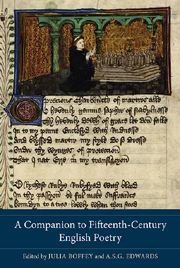Book contents
- Frontmatter
- Contents
- List of Contributors
- List of Abbreviations
- Conventions
- Introduction
- Part I Background and Context
- Part II Authors
- 3 Thomas Hoccleve
- 4 Thomas Hoccleve's Regiment of Princes
- 5 John Lydgate's Major Poems
- 6 John Lydgate's Religious Poetry
- 7 John Lydgate's Shorter Secular Poems
- 8 John Capgrave and Osbern Bokenham: Verse Saints' Lives
- 9 Peter Idley and George Ashby
- 10 John Audelay and James Ryman
- Part III Themes and Genres
- Chronology
- Index of Manuscripts
- General Index
3 - Thomas Hoccleve
from Part II - Authors
Published online by Cambridge University Press: 05 July 2013
- Frontmatter
- Contents
- List of Contributors
- List of Abbreviations
- Conventions
- Introduction
- Part I Background and Context
- Part II Authors
- 3 Thomas Hoccleve
- 4 Thomas Hoccleve's Regiment of Princes
- 5 John Lydgate's Major Poems
- 6 John Lydgate's Religious Poetry
- 7 John Lydgate's Shorter Secular Poems
- 8 John Capgrave and Osbern Bokenham: Verse Saints' Lives
- 9 Peter Idley and George Ashby
- 10 John Audelay and James Ryman
- Part III Themes and Genres
- Chronology
- Index of Manuscripts
- General Index
Summary
Thomas Hoccleve began the practice of poetry at a crucial juncture, just at the start of the Lancastrian era, when poets were attempting to adapt the achievements of their late fourteenth-century predecessors to a new set of cultural conditions. As a clerk of the Privy Seal, Hoccleve himself was professionally well placed to negotiate this transition. Although he lacked the social rank and learning of his poetic ‘masters’, Chaucer and Gower, his employment in the world of London's elite clerks, where these authors were well known, enabled him to absorb and perpetuate their example, while he also had first-hand knowledge of the administrative crises and dynastic projects that would define the new regime (for biography, see Burrow 1994; Mooney 2007; Richardson 1986). A position so close to the heart of the king's government was not without its challenges, however, and recent accounts of Hoccleve's writings have explored his troubled engagement with the approved narratives of Lancastrian rule (Strohm 1998, 1999; Patterson 2001; Meyer-Lee 2007; Cole 2008).
Hoccleve's poetry is distinctive in its preference for two structuring principles: first, a compelling authorial presence, often the engagingly real, quasi-autobiographical persona (‘Thomas’ or ‘Occleve’) whose personal afflictions mirror the larger problems of the realm; second, a narrative that examines the origin of political selfhood and poetic authority. In this narrative, which Hoccleve repeats in various forms, an anguished figure moves from a state of profound disorientation, through dialogic encounters that serve to expose and cure his deficiencies, to a recognised position within the social order, where he is authorised by a sovereign power to engage in poetic discourse.
- Type
- Chapter
- Information
- A Companion to Fifteenth-Century English Poetry , pp. 35 - 46Publisher: Boydell & BrewerPrint publication year: 2013



